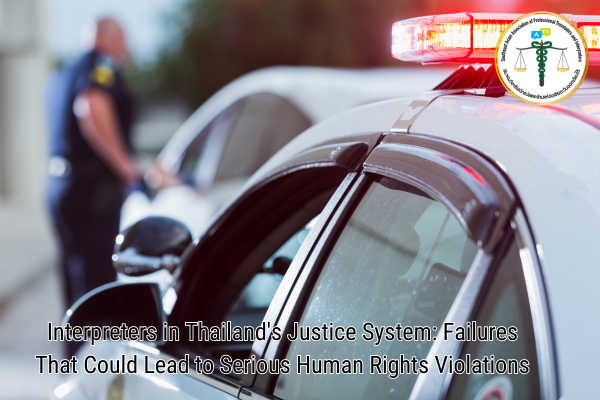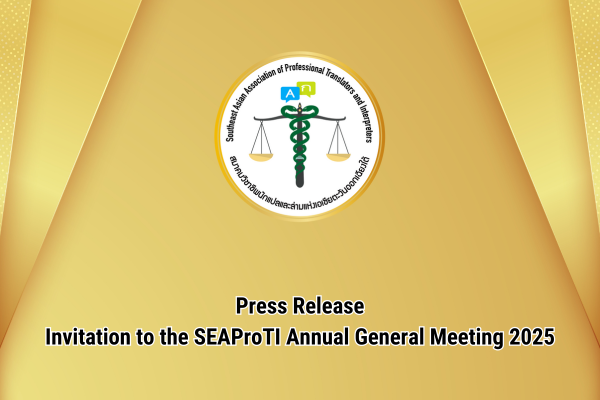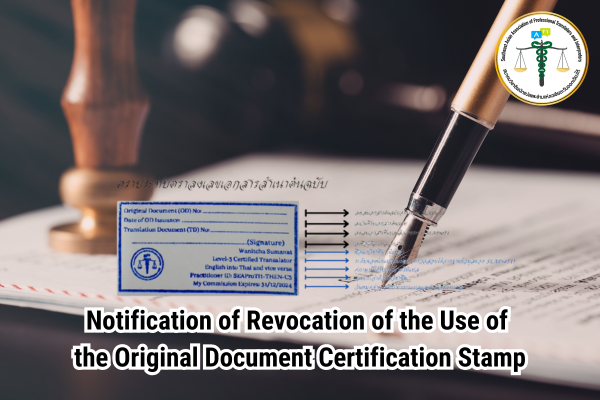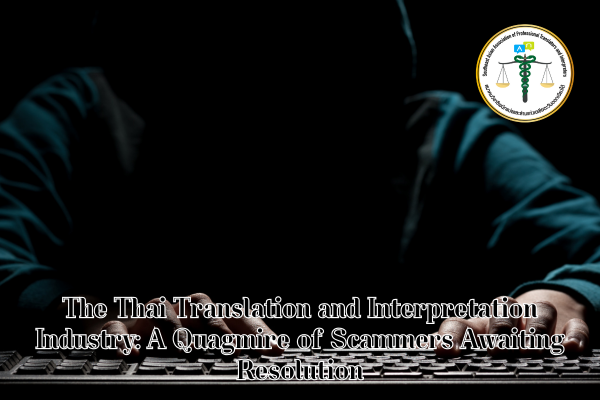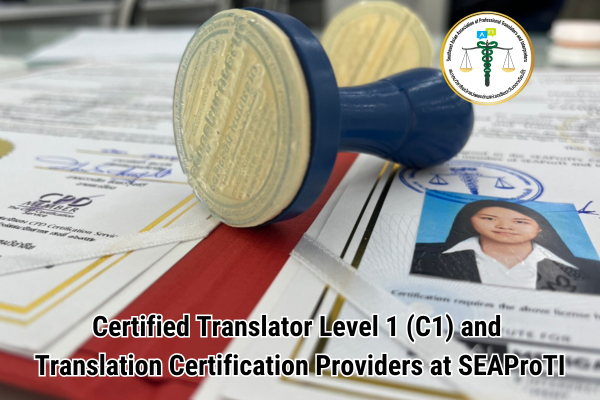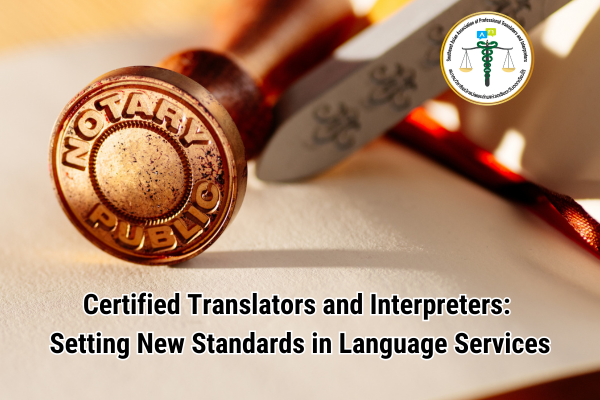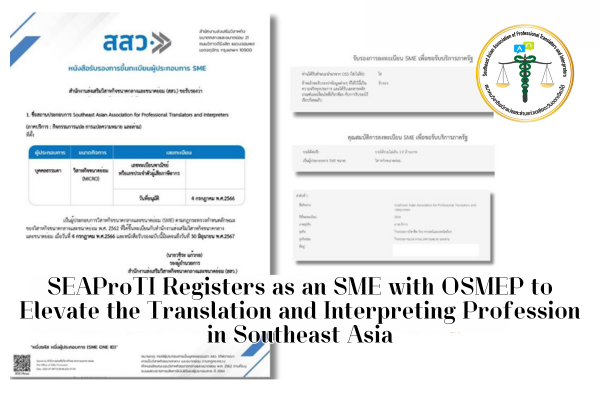Interpreters in Thailand’s Justice System: Failures
That Could Lead to Serious Human Rights Violations
December 30, 2024, Bangkok – The right to an interpreter in judicial proceedings is a fundamental right recognized under international principles and Thai law. This right is rooted in the protection of human rights and equality before the law. Thailand, as a state party to the International Covenant on Civil and Political Rights (ICCPR), upholds the right to an interpreter for individuals who cannot understand or speak the language used in court. However, despite ongoing training programs organized by government agencies, issues in the availability and quality of interpreters remain significant obstacles to accessing justice for foreign suspects and defendants.
In Thailand, Section 13 of the Criminal Procedure Code is the primary provision guaranteeing the right to an interpreter. It mandates the use of Thai for investigation, preliminary hearings, or court proceedings but requires the appointment of an interpreter when necessary. Investigators, prosecutors, or courts are obliged to provide interpreters without delay. Although this legal framework is in place, practical issues persist, which could lead to severe human rights violations.
Major Challenges
-
Shortage of Qualified Interpreters
A critical issue is the lack of skilled interpreters, particularly for less common languages. This shortage sometimes results in the use of unqualified interpreters, potentially leading to misinterpretations and unjust rulings. Inadequate compensation for interpreters is another factor that hinders the recruitment of skilled professionals, thereby impacting the overall standard of interpretation in the justice system. -
Lack of Certification and Standards
There is no standardized system to certify interpreters in the justice system, resulting in an absence of systematic quality control. While interpreter training is conducted regularly, there are no clear benchmarks to assess interpreters’ competencies, posing risks of engaging interpreters who lack legal terminology knowledge or an understanding of judicial processes. -
Insufficient Legal and Judicial Knowledge
Many interpreters lack adequate knowledge of legal terms and judicial procedures, which can result in inaccurate or incomplete interpretations, particularly in complex or serious cases, such as those involving the death penalty. Misinterpretation due to insufficient understanding of legal nuances may prevent defendants from fully comprehending their rights, leading to poor decision-making during their defense.
Although the Office of the Judiciary has developed a code of ethics for court interpreters to ensure standardized and ethical performance, enforcement and follow-up remain insufficient. Practical challenges in interpreters’ performance still prevail.
Additional Issues in Pre-Trial Proceedings
Challenges also arise during the investigation phase, a critical stage in the justice process. A lack of competent interpreters at this stage can prevent suspects from accurately testifying or clarifying facts, adversely affecting subsequent proceedings.
While initiatives such as the “Interpreters in the Justice System” training courses conducted by the Lawyers Council of Thailand and other agencies aim to address these issues, they are insufficient to resolve all the challenges. The lack of coordination among agencies and the absence of systematic follow-up impede substantial progress.
Broader Implications
These problems affect not only the rights of foreign suspects and defendants but also Thailand’s international reputation in administering justice. Ignoring these issues could lead to violations of Thailand’s international obligations and expose the country to criticism from the global community.
Sustainable Solutions
To address these challenges sustainably, Thailand must undertake serious reforms in the recruitment and development of interpreters in the justice system. Key measures include:
- Establishing a professional certification system for interpreters.
- Developing training programs that emphasize legal and judicial knowledge.
- Improving compensation to attract qualified interpreters.
- Fostering collaboration among justice system agencies to enhance the efficiency of interpreter services.
Ultimately, addressing these issues is not merely about fulfilling international obligations but also about elevating the standard of Thailand’s justice system to align with global norms. It ensures that all individuals, whether Thai or foreign, receive equal and fair justice under Thai law.
About SEAProTI’s certified translators, translation certification providers, and certified interpreters:
The Southeast Asian Association of Professional Translators and Interpreters (SEAProTI) has officially announced the criteria and qualifications for individuals to register as “Certified Translators,” “Translation Certification Providers,” and “Certified Interpreters” under the association’s regulations. These guidelines are detailed in Sections 9 and 10 of the Royal Thai Government Gazette, issued by the Secretariat of the Cabinet under the Office of the Prime Minister of the Kingdom of Thailand, dated July 25, 2024, Volume 141, Part 66 Ng, Page 100.
To read the full publication, visit: the Royal Thai Government Gazette
ล่ามในกระบวนการยุติธรรมไทย:
ความล้มเหลวที่อาจนำไปสู่การละเมิดสิทธิมนุษยชนอย่างร้ายแรง
30 ธันวาคม 2567, กรุงเทพ – สิทธิในการมีล่ามในกระบวนการยุติธรรมเป็นสิทธิขั้นพื้นฐานที่ได้รับการรับรองตามหลักสากลและกฎหมายไทย โดยมีรากฐานมาจากหลักการคุ้มครองสิทธิมนุษยชนและความเสมอภาคตามกฎหมาย ประเทศไทยได้เข้าร่วมเป็นภาคีในกติการะหว่างประเทศว่าด้วยสิทธิพลเมืองและสิทธิทางการเมือง (ICCPR) ซึ่งรับรองสิทธิในการมีล่ามสำหรับบุคคลที่ไม่สามารถเข้าใจหรือพูดภาษาที่ใช้ในศาลได้ อย่างไรก็ตาม แม้จะมีการฝึกอบรมล่ามอย่างต่อเนื่องโดยหน่วยงานราชการ แต่ปัญหาในการจัดหาและคุณภาพของล่ามยังคงเป็นอุปสรรคสำคัญในการเข้าถึงความยุติธรรมของผู้ต้องหาและจำเลยชาวต่างชาติ
ในประเทศไทย ประมวลกฎหมายวิธีพิจารณาความอาญา มาตรา 13 เป็นบทบัญญัติหลักที่รับรองสิทธิในการมีล่าม โดยกำหนดให้ใช้ภาษาไทยในการสอบสวน ไต่สวนมูลฟ้อง หรือพิจารณาคดี แต่หากมีความจำเป็นต้องแปลภาษา ให้ใช้ล่ามแปล โดยพนักงานสอบสวน พนักงานอัยการ หรือศาลมีหน้าที่จัดหาล่ามให้โดยไม่ชักช้า แม้จะมีกฎหมายรองรับ แต่ในทางปฏิบัติยังพบปัญหาหลายประการที่อาจนำไปสู่การละเมิดสิทธิมนุษยชนอย่างร้ายแรง
ปัญหาสำคัญประการแรกคือการขาดแคลนล่ามที่มีความชำนาญ โดยเฉพาะในภาษาที่ไม่แพร่หลาย ทำให้ในบางกรณีต้องใช้ล่ามที่ไม่มีคุณสมบัติเพียงพอ ซึ่งอาจส่งผลให้การแปลความหมายผิดพลาด และนำไปสู่การตัดสินคดีที่ไม่เป็นธรรม นอกจากนี้ ค่าตอบแทนล่ามที่ไม่เพียงพอยังเป็นอีกปัจจัยหนึ่งที่ทำให้ไม่สามารถดึงดูดผู้มีความสามารถเข้ามาทำงานในระบบได้ ส่งผลให้คุณภาพของการแปลในกระบวนการยุติธรรมไม่ได้มาตรฐาน
ปัญหาที่สองคือการขาดระบบรับรองมาตรฐานและคุณสมบัติของล่ามในกระบวนการยุติธรรม ทำให้ไม่มีการควบคุมคุณภาพของล่ามอย่างเป็นระบบ แม้จะมีการฝึกอบรมล่ามอย่างต่อเนื่อง แต่ยังไม่มีการกำหนดมาตรฐานที่ชัดเจนในการประเมินความสามารถของล่าม ทำให้เกิดความเสี่ยงในการใช้ล่ามที่ไม่มีความรู้ความเข้าใจในศัพท์กฎหมายและกระบวนการยุติธรรมอย่างเพียงพอ
ปัญหาที่สามคือการขาดความรู้ความเข้าใจของล่ามในด้านกฎหมายและกระบวนการยุติธรรม ซึ่งอาจทำให้การแปลความหมายไม่ถูกต้องหรือไม่ครบถ้วน โดยเฉพาะในคดีที่มีความซับซ้อนหรือมีโทษหนัก เช่น คดีที่มีโทษประหารชีวิต การขาดความเข้าใจในศัพท์เฉพาะทางกฎหมายอาจส่งผลให้จำเลยไม่สามารถเข้าใจสิทธิของตนเองได้อย่างถูกต้อง และอาจนำไปสู่การตัดสินใจที่ผิดพลาดในการต่อสู้คดี
แม้ว่าหน่วยงานราชการหลายแห่งจะได้จัดทำประมวลจริยธรรมล่ามในกระบวนการยุติธรรม เพื่อให้การทำหน้าที่ของล่ามเป็นไปในแนวทางเดียวกันและมีมาตรฐาน แต่การบังคับใช้และการติดตามผลยังไม่มีประสิทธิภาพเพียงพอ ทำให้ในทางปฏิบัติยังคงมีปัญหาในการทำหน้าที่ของล่ามอยู่มากนอกจากนี้ ยังมีปัญหาในเรื่องของการจัดหาล่ามในชั้นสอบสวน ซึ่งเป็นขั้นตอนสำคัญในกระบวนการยุติธรรม การขาดล่ามที่มีคุณภาพในขั้นตอนนี้อาจทำให้ผู้ต้องหาไม่สามารถให้การหรือชี้แจงข้อเท็จจริงได้อย่างถูกต้อง ส่งผลกระทบต่อการดำเนินคดีในขั้นตอนต่อไป
แม้ว่าจะมีความพยายามในการแก้ไขปัญหาโดยการจัดอบรมหลักสูตร “ล่ามในกระบวนการยุติธรรม” โดยหน่วยงานอื่นๆ แต่การอบรมเหล่านี้ยังไม่เพียงพอที่จะแก้ไขปัญหาทั้งหมดได้ เนื่องจากยังขาดการบูรณาการระหว่างหน่วยงานและการติดตามผลอย่างเป็นระบบ
ปัญหาเหล่านี้ไม่เพียงแต่ส่งผลกระทบต่อสิทธิของผู้ต้องหาและจำเลยชาวต่างชาติเท่านั้น แต่ยังส่งผลต่อภาพลักษณ์ของกระบวนการยุติธรรมไทยในสายตานานาชาติด้วย การละเลยปัญหาเหล่านี้อาจนำไปสู่การละเมิดพันธกรณีระหว่างประเทศของไทยและอาจถูกวิพากษ์วิจารณ์จากประชาคมระหว่างประเทศได้
ในการแก้ไขปัญหาอย่างยั่งยืน จำเป็นต้องมีการปฏิรูประบบการจัดหาและพัฒนาล่ามในกระบวนการยุติธรรมอย่างจริงจัง โดยการสร้างระบบรับรองมาตรฐานวิชาชีพล่าม การพัฒนาหลักสูตรการอบรมที่เน้นความรู้ด้านกฎหมายและกระบวนการยุติธรรม การปรับปรุงค่าตอบแทนให้เหมาะสม และการสร้างความร่วมมือระหว่างหน่วยงานในกระบวนการยุติธรรมเพื่อพัฒนาระบบล่ามให้มีประสิทธิภาพมากยิ่งขึ้น
ท้ายที่สุด การแก้ไขปัญหาล่ามในกระบวนการยุติธรรมไทยไม่ใช่เพียงการปฏิบัติตามพันธกรณีระหว่างประเทศเท่านั้น แต่ยังเป็นการยกระดับมาตรฐานกระบวนการยุติธรรมของประเทศไทยให้ทัดเทียมกับนานาอารยประเทศ และเป็นการสร้างหลักประกันว่าบุคคลทุกคน ไม่ว่าจะเป็นชาวไทยหรือชาวต่างชาติ จะได้รับความยุติธรรมอย่างเท่าเทียมกันภายใต้กฎหมายไทย
เกี่ยวกับนักแปลรับรอง ผู้รับรองการแปล และล่ามรับรองของสมาคมวิชาชีพนักแปลและล่ามแห่งเอเชียตะวันออกเฉียงใต้
สมาคมวิชาชีพนักแปลและล่ามแห่งเอเชียตะวันออกเฉียงใต้ (SEAProTI) ได้ประกาศหลักเกณฑ์และคุณสมบัติผู้ที่ขึ้นทะเบียนเป็น “นักแปลรับรอง (Certified Translators) และผู้รับรองการแปล (Translation Certification Providers) และล่ามรับรอง (Certified Interpreters)” ของสมาคม หมวดที่ 9 และหมวดที่ 10 ในราชกิจจานุเบกษา ของสำนักเลขาธิการคณะรัฐมนตรี ในสำนักนายกรัฐมนตรี แห่งราชอาณาจักรไทย ลงวันที่ 25 ก.ค. 2567 เล่มที่ 141 ตอนที่ 66 ง หน้า 100 อ่านฉบับเต็มได้ที่: นักแปลรับรอง ผู้รับรองการแปล และล่ามรับรอง
ที่มา:
1 ประมวลกฎหมายวิธีพิจารณาความอาญา มาตรา 13
2 บทความวิจัยเรื่อง “มาตรการทางกฎหมายในการจัดหาล่ามให้จำเลยชาวต่างชาติ” จากวารสารบัณฑิตศึกษา
3 บทความวิจัยเรื่อง “การกำหนดคุณสมบัติล่าม : ศึกษากรณีที่เด็กและเยาวชนเป็นผู้ถูกกล่าวหา” จากวารสารบัณฑิตศึกษา
4 บทความวิจัยเรื่อง “การมีล่ามในชั้นสอบสวนคดีอาญา” จากวารสารนิติศาสตร์
5 คู่มือล่ามในกระบวนการยุติธรรม จากสำนักงานกิจการยุติธรรม
9 บทความเรื่อง “Challenges, Solutions for Legal Interpreters in Thailand in 2024” จาก SEAProTI


